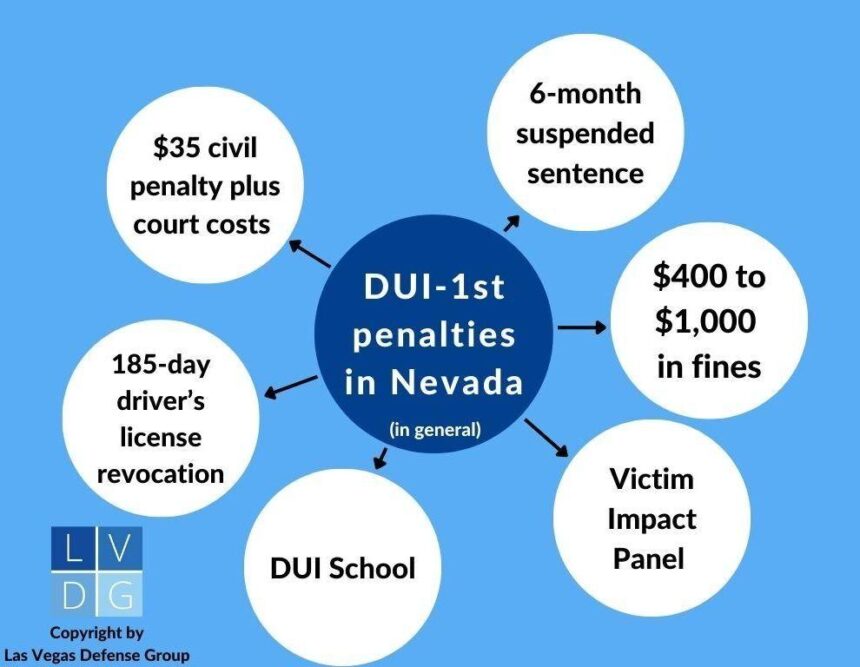Nevada Fails to Enact New DUI Fatality Legislation Amid Escalating Crisis
In the recent legislative session,Nevada lawmakers adjourned without approving any new statutes aimed at tackling fatal incidents caused by driving under the influence (DUI). This outcome comes despite mounting public pressure and multiple legislative proposals designed to toughen penalties and improve prevention strategies for DUI-related deaths. The stalemate leaves Nevada’s DUI legal framework unchanged, raising concerns about the state’s ability to effectively combat impaired driving and improve traffic safety.
Despite the alarming increase in DUI fatalities statewide, legislators could not agree on critical reforms that would impose stricter consequences or broaden enforcement capabilities. Advocates warn that this legislative inaction risks perpetuating dangerous driving behaviors and endangering more lives.
Among the key proposals that stalled were:
- Compulsory ignition interlock devices for first-time offenders involved in fatal crashes
- Heightened mandatory minimum sentences for DUI manslaughter convictions
- Enhanced training programs for law enforcement focused on detecting impairment
| Year | DUI-Related Deaths | Legislative Action Taken |
|---|---|---|
| 2021 | 98 | Enacted |
| 2022 | 112 | Partial Measures |
| 2023 | 129 | No New Laws |
Experts caution that without stronger deterrents, the rising trend in fatal DUI crashes may persist, leaving communities vulnerable to preventable tragedies.
Legislative Deadlock Stalls Essential DUI Law Reforms in Nevada
Despite growing public demand for stricter DUI regulations, Nevada’s legislature reached a deadlock this session, failing to pass significant reforms targeting fatal DUI offenses. The primary source of contention centered on the severity of proposed penalties. Some legislators expressed concern that harsher sentences might disproportionately affect non-violent offenders, while advocates insisted on zero-tolerance policies to curb reckless driving. Additionally, debates over budget priorities and the effectiveness of current enforcement methods further intricate consensus-building.
Several bills aimed at strengthening DUI laws—including increased mandatory minimum sentences, broader ignition interlock requirements, and tougher sanctions for repeat offenders—were ultimately shelved amid intense debate. This legislative inaction leaves Nevada relying on existing statutes widely criticized as inadequate by safety advocates. Below is a summary of key proposals that failed to advance:
| Proposal | Key Provision | Legislative Result |
|---|---|---|
| Mandatory Minimum Sentences | 2 to 5 years imprisonment for DUI causing death | Rejected |
| Ignition Interlock Expansion | Required for all DUI convictions | Postponed |
| Repeat Offender Penalties | License suspension extended to 3 years | Failed |
- Divided committee votes prevented unified support for enforcement enhancements.
- Lobbying pressures from various stakeholders influenced legislative hesitation.
- Calls for stronger collaboration between law enforcement agencies and policymakers continue to intensify.
Consequences of Legislative Inaction on Nevada Communities and Victims
The failure to update DUI laws addressing fatal crashes has profound repercussions for Nevada’s communities and the families of victims. This legislative stagnation not only denies justice and closure to those affected but also sends a dangerous signal to potential offenders, possibly emboldening risky behavior behind the wheel. Families grappling with loss often endure prolonged emotional distress and financial hardship, compounded by the absence of legislative progress.
Public safety professionals emphasize that this inertia undermines broader efforts to safeguard Nevada’s roadways. Key concerns include:
- Heightened likelihood of repeat DUI offenses due to insufficient penalties
- Increased strain on law enforcement agencies lacking enhanced legal tools
- Declining public trust in the government’s commitment to traffic safety
| Impact | Effect on Community |
|---|---|
| Judicial Delays | Prolonged case processing for fatal DUI incidents |
| Insufficient Victim Support | Limited access to counseling and restitution services |
| Eroded Public Confidence | Growing skepticism about lawmakers’ dedication to road safety |
Calls for Comprehensive DUI Policy Reform and Enhanced Enforcement
In light of the persistent challenges posed by impaired driving fatalities, experts assert that Nevada’s current DUI statutes are insufficient to address the severity of these offenses. Advocates urge a thorough revision of DUI laws, arguing that incremental changes have failed to deter repeat offenders or reduce fatal crashes. Criticism also targets the fragmented enforcement approach, which lacks coordination and adequate resources.
A coalition of legal professionals, public safety officials, and victim advocates recommends several pivotal reforms to bolster Nevada’s response to fatal DUI cases, including:
- Mandatory ignition interlock devices for all DUI offenders involved in fatal crashes
- Increased budget allocations for DUI enforcement units equipped with advanced detection technology
- Uniform statewide protocols to expedite and standardize legal proceedings
- Expanded educational campaigns targeting high-risk populations and peak times for impaired driving
| Proposed Reform | Anticipated Benefit |
|---|---|
| Stricter sentencing guidelines | Stronger deterrence against impaired driving |
| Real-time DUI checkpoints | Higher immediate arrest rates |
| Victim assistance programs | Enhanced recovery and support for affected families |
| Inter-agency task forces | Improved coordination and resource sharing |
Final Thoughts on Nevada DUI Legislation and Road Safety
As the legislative session closes without enacting new DUI laws addressing fatal crashes, Nevada remains without updated mechanisms to increase accountability and prevent future tragedies. The inability of lawmakers to find common ground leaves advocates and bereaved families urging renewed commitment in upcoming sessions. This ongoing debate highlights the complex balance between public safety priorities, legal fairness, and community concerns in the ongoing battle against impaired driving.
